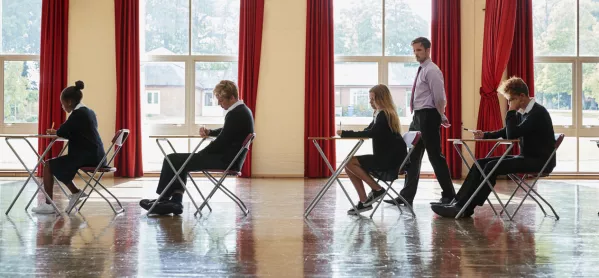- Home
- ‘We must build a better, fairer assessment system’
‘We must build a better, fairer assessment system’

Following the cancellation of this year’s summer exam session, teachers have been asked to grade and rank their students using other means.
Even though the logistics have been set out, doubts linger that a set of fair, reliable and accurate grades can be secured in this way.
A survey on Tes, for example, of 19,000 school staff found that fewer than half of teachers and other school staff in England believe that all GCSE and A-level candidates will get a “fair deal” from teacher-assessed grades.
Elsewhere, the Equalities Commission, for example, has raised concerns about “unconscious bias towards black and ethnic minority students”, while the Sutton Trust reported that a survey of students found that 72 per cent feel the “calculated grading process was less fair than exam grades”.
The problem does not just stop with the candidates of 2020. By all accounts, next year’s cohorts are lagging behind - so much so that headteachers unions are calling for content to be reduced.
Even more notably, some are calling for the 2021 examinations to be abandoned altogether.
We must plan ahead
With the present and future equally unstable, this is the moment to plan strategically. The pupils, the profession and the public must never be placed in this position again.
Who wants grades that are even more questionable than those produced by the vagaries of marking?
We cannot assume that next year will be different from this summer, so we cannot leave assessment plans to the last minute.
Evidence that can be referred back to is desperately needed so that schools and students can have the right of appeal, if nothing else.
If students are doing the same tasks then there is a much greater chance of comparing like with like. The pragmatic approach would be to return to course work assessed over the year.
Looking through the telescopic lens of our current (functional, results-driven) culture, I feel more than usually nostalgic for The Community of Assessment Practice that existed over thirty years ago.
Backwards to go forwards
In 1987-1988, the first years of GCSE, teachers were trusted to act as a professional body, capable of making sure that all candidates were judged fairly.
My school was just one of the many whose English departments had opted for 100 per cent coursework assessment in GCSE English language and English literature.
This system worked because it had been planned for and the personnel already selected. Teachers were trained rigorously in how to assess coursework and how to apply the criteria; they undertook ‘trial marking’ standardisation and had to submit their results to the board.
Time in school was given over to departments to conduct internal moderation - whole days. I clearly remember standing with colleagues in a classroom with the folders for each of the 300-plus students in the year group set up in grade clusters, and then ranked within.
Attuned assessment
It was a mammoth task, informed by the individual and collective judgements of members of the department, some of whom had also been recruited to moderate at national level.
Once we had submitted teacher-assessed grades for each student, a sample of folders would be requested by the exam board and sent to our designated inter-school assessor - the first layer of external moderation.
Then towards the end of the summer term, all our students’ coursework folders would be sent to the exam board’s HQ, where they would be scrutinised by members of the review panel - the second layer of coursework moderators, all of them experienced serving English teachers.
Only the most consistent and reliable markers were invited to join the inter-school assessors and the review panel, but many schools were represented and genuinely felt collective ownership of the system.
They were able to feed their experience back into their teaching and assessment in the next school year.
As such, there was a growing and ongoing consensus about assessment standards, and a real community of assessment practice.
Professionalism returns
Unlike 30 years ago, the task facing teachers in schools right now is a bit like fencing with shadows. The evidence that teachers will judge their students on is not at all like the coursework that determined judgements in the past.
Students’ efforts of the past two years (2018-2020) have been geared towards a point in the future, much of the work provisional and incomplete; in the past, it was on the product of two years’ work in students’ files, set and marked by teachers for the express purpose of determining a fair overall grade.
Reinstating coursework - with teachers setting more diverse tasks, which could be planned and drafted to show the students’ best work - would widen the curriculum beyond the merely instrumental.
These pieces could be banked before any external paper is taken. We would have learning that could be meaningfully assessed and scrutinised if need to be to satisfy the critics and doubters (of whom there are many at the present time).
Teaching and learning could once more take centre stage. Tasks could be more than just compliance exercises to satisfy assessment objectives to be tested at a point that, on the experience of this year, might not take place.
That’s why it’s time to re-professionalise teachers as assessors so that we can rebuild a collaborative, self-sustaining system.
Register with Tes and you can read two free articles every month plus you'll have access to our range of award-winning newsletters.
Keep reading with our special offer!
You’ve reached your limit of free articles this month.
- Unlimited access to all Tes magazine content
- Save your favourite articles and gift them to your colleagues
- Exclusive subscriber-only stories
- Over 200,000 archived articles
- Unlimited access to all Tes magazine content
- Save your favourite articles and gift them to your colleagues
- Exclusive subscriber-only stories
- Over 200,000 archived articles



